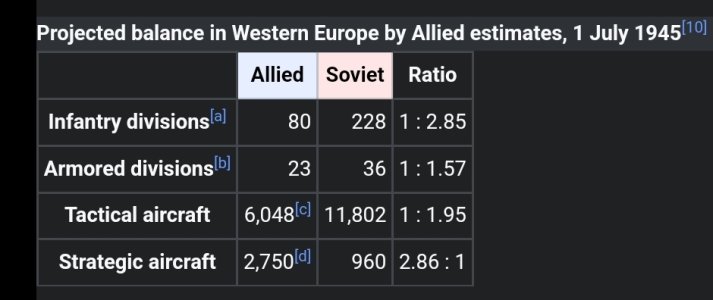I think that such a war would have to begin (and end) before the Soviets get any nukes.
I think so, too. At the least, a Russian atomic bomb would probably lead to some kind of peace deal. A worst-case scenario might have the Russians actually using an atomic bomb, on the battlefield or on a German or Polish city.
The battleground would primarily be Eastern Europe.
I agree. I think the goal for the Western Allies would be to restore the 1939 borders. If there were any fighting in the Pacific, it would be without consequence, and everybody involved would know it. I could imagine Russian and American troops facing each other in Hokkaido or Manchuria, hardly interested in doing much.
The US and its allies would absolutely be able to cream the Soviets in Europe with airpower and nuclear weapons. Also remember that the Soviets were quite dependent on help and aid from primarily the US while they fought Hitler.
I don't know how far east Allied airpower could reach. I don't know how intact Germany's airfields were in 1946-7, for instance. Could the 8th Air Force have moved its entire infrastructure to Cologne, Frankfurt and Hamburg? Or would they still be flying from the same bases in England? I really don't know. I imagine they'd be reluctant to use atomic bombs in Germany or Poland, but maybe they would use one on a battlefield, away from cities, or against Russian ships in the Baltic or Black Sea. Maybe even just a single American bomber could fly from England, refuel in Denmark or Sweden, and drop an atomic bomb on a Soviet naval base in one of the small Baltic countries.
I reckon Stalin would withdraw his forces to the USSR proper to preserve his regime intact and make peace, because everyone were fed up with the war anyway in 1945. I don't really see any scenario where the Americans would invade or occupy Soviet territory, perhaps with the exception of pockets of territory closest to Japan. Recall that the Americans had built up a quite formidable Pacific fighting force in 1945 and after Japan is defeated, it would be free to engage the Eastern part of the USSR.
I could imagine a fight for Berlin. Then if the road to Warsaw was open, then okay. But how much did the Western Allies care about Prague or Budapest or Zagreb?
I can imagine, at the end of this scenario, an alternate Earth where Poland is the country that got split in half instead of Germany.
British and US politicians would have hard time explaining to their people why they are still good guys despite being clear aggressors and backstabbing their ally. But they'd manage.
Your other points could be argued, but this one is easy: US politicians have never had any trouble with that. They've gotten the US into a war nearly every time they've wanted one. That's partly why I cited the instigating naval incidents that have played a part in drawing the US into almost every war we've ever fought.
I don't see any conflict as being more than localized skirmishes. In 1945 it was still an open question as to what the post-war environment would look like. Even in 1946 there was the serious American proposal to put nuclear energy, including nuclear weapons,
under the control of the United Nations.
There might be localized skirmishes in the Turkish Straights Crisis, or over the soviet withdrawal from Iran/Caucuses, but nobody had interest or resources for a big war. The UK was broke and had to implement even tougher rationing than during wartime. The Soviet Union was exhausted, with even the apparently limitless pool of manpower for the Red Army running dry. America was demobilizing with all speed possible and rapidly downsizing forces.
Plus, what Patton wanted didn't really matter. He didn't control the US military, Truman did. In 1949 during the
'revolt of the Admirals' Truman was confident enough to tell the military brass to get stuffed.
Well, if we're trying to craft a scenario in which it could happen, we have to be willing to suspend disbelief and bend history to our whim.

